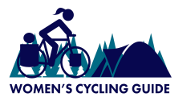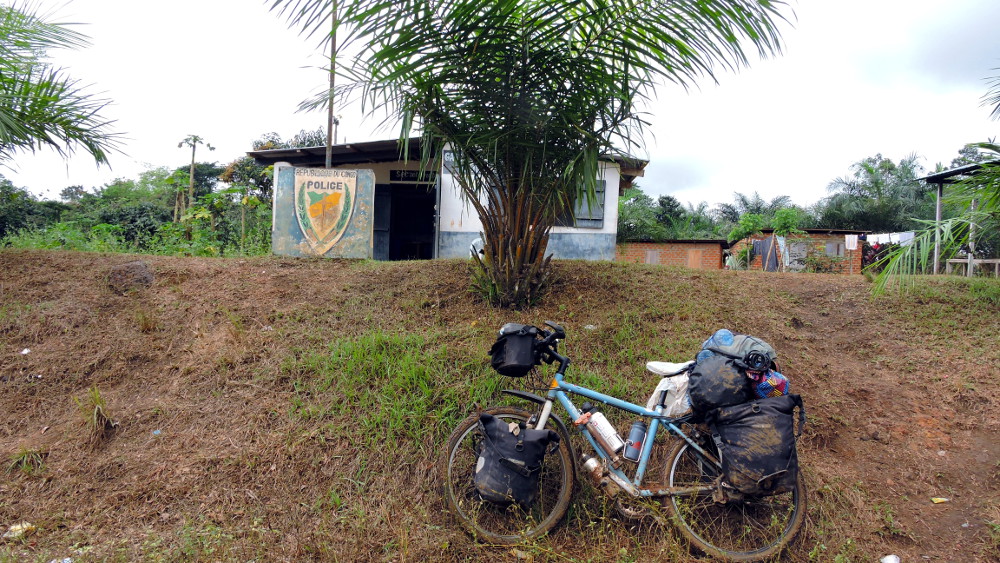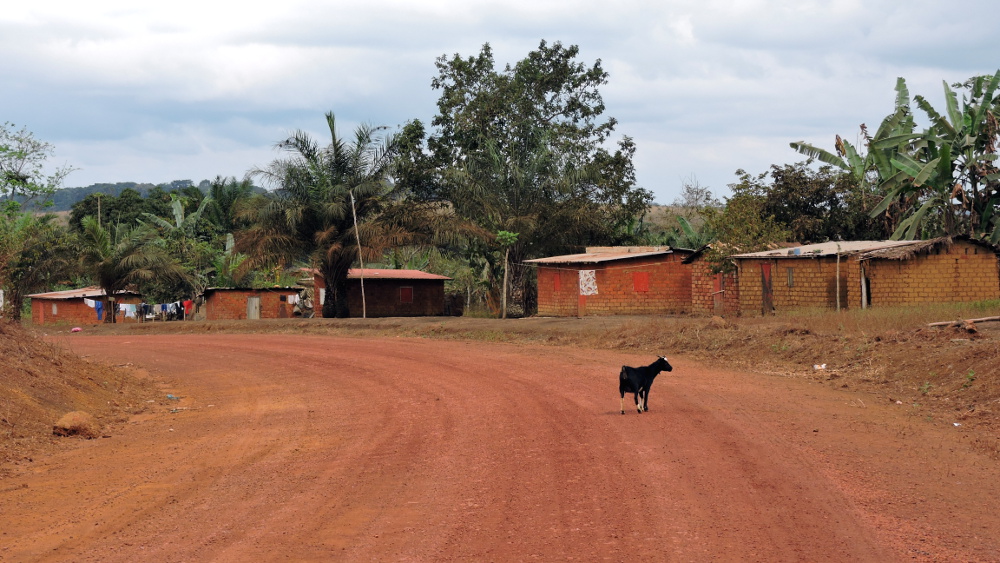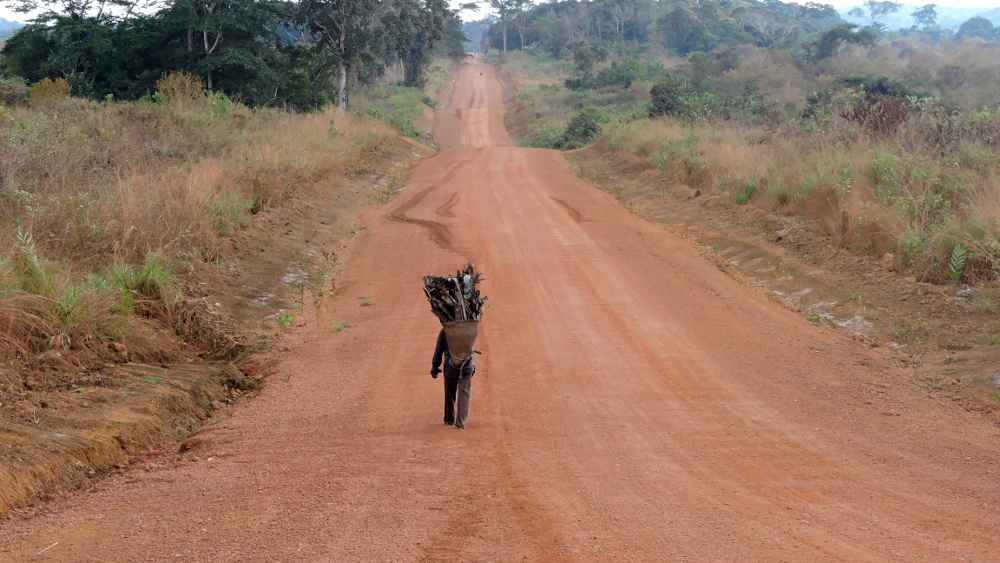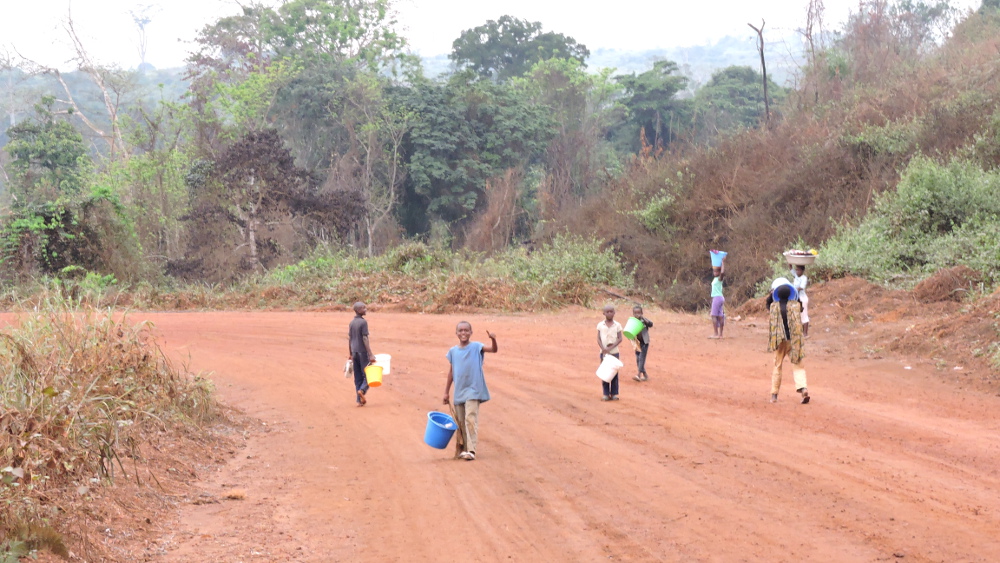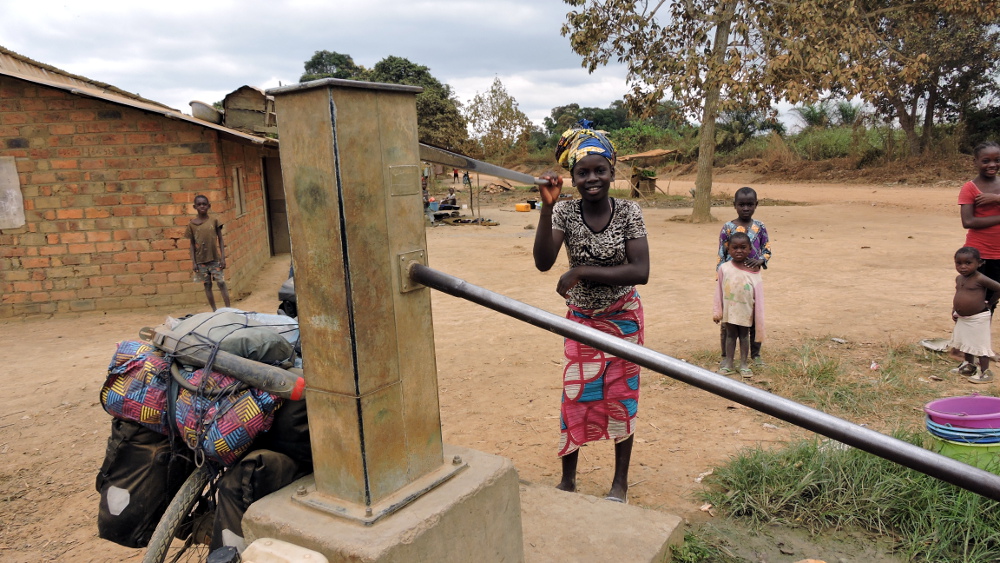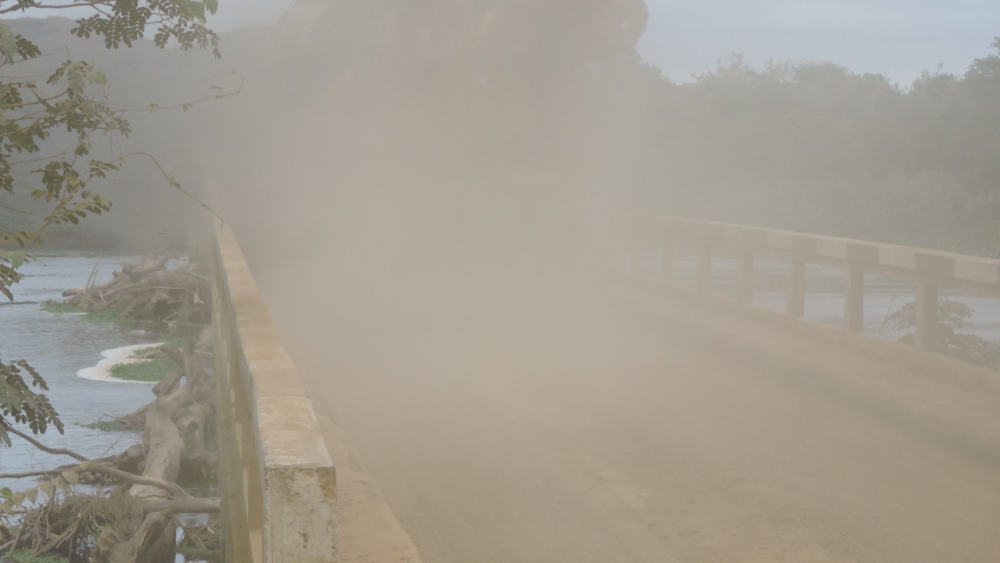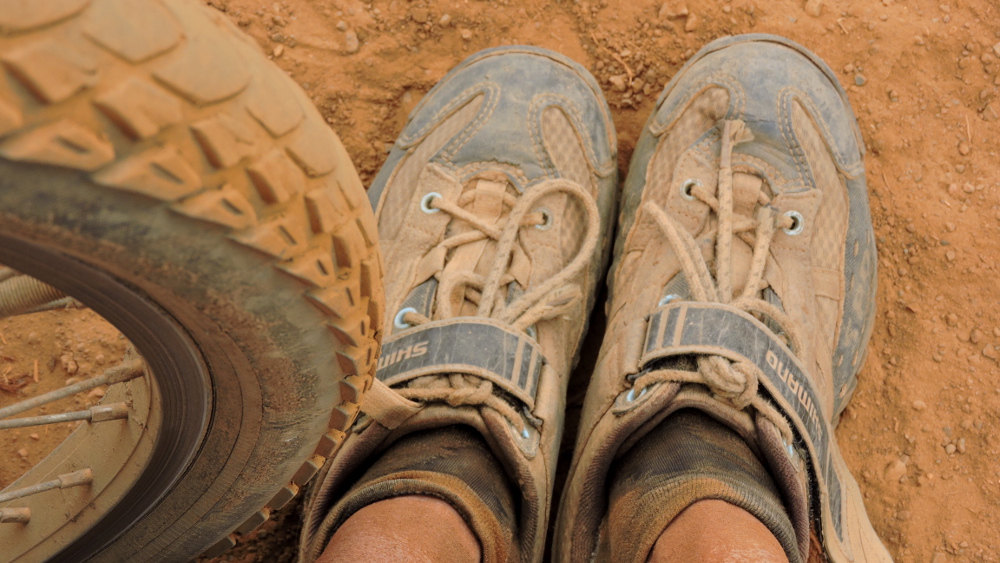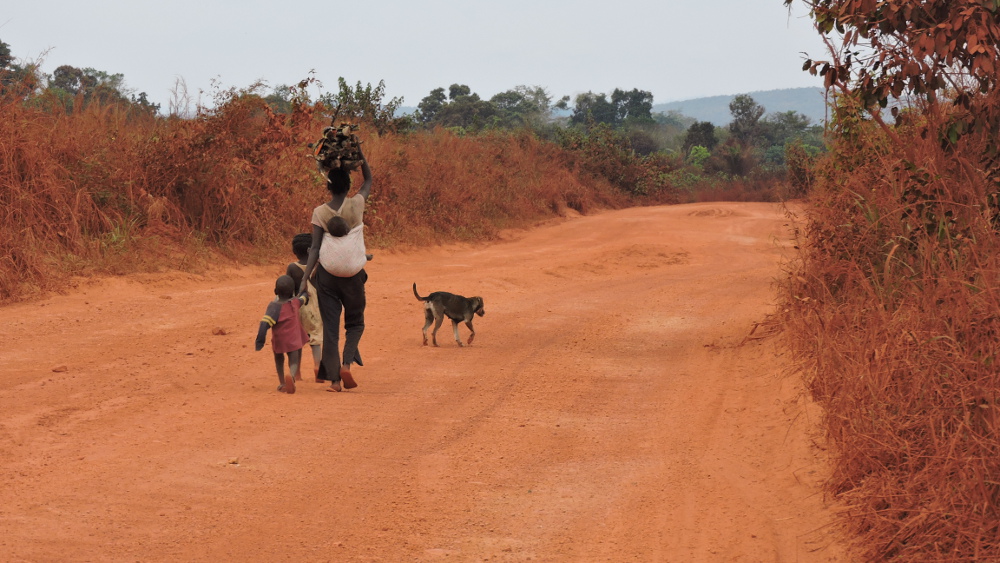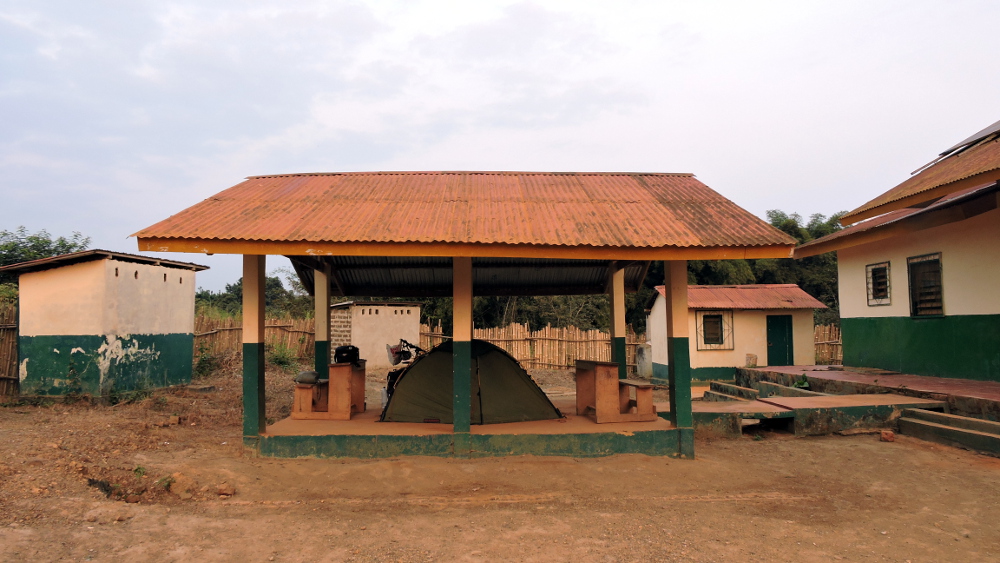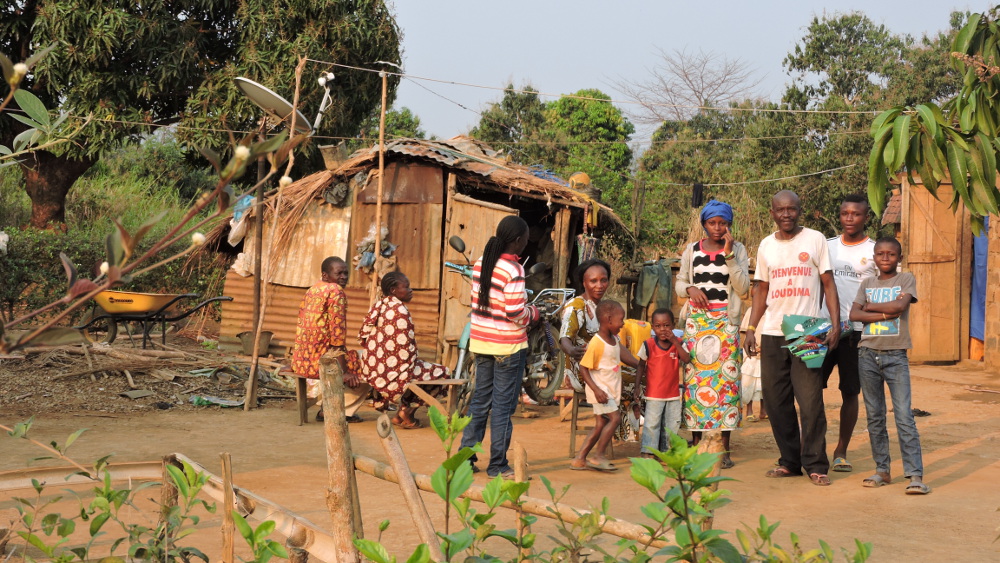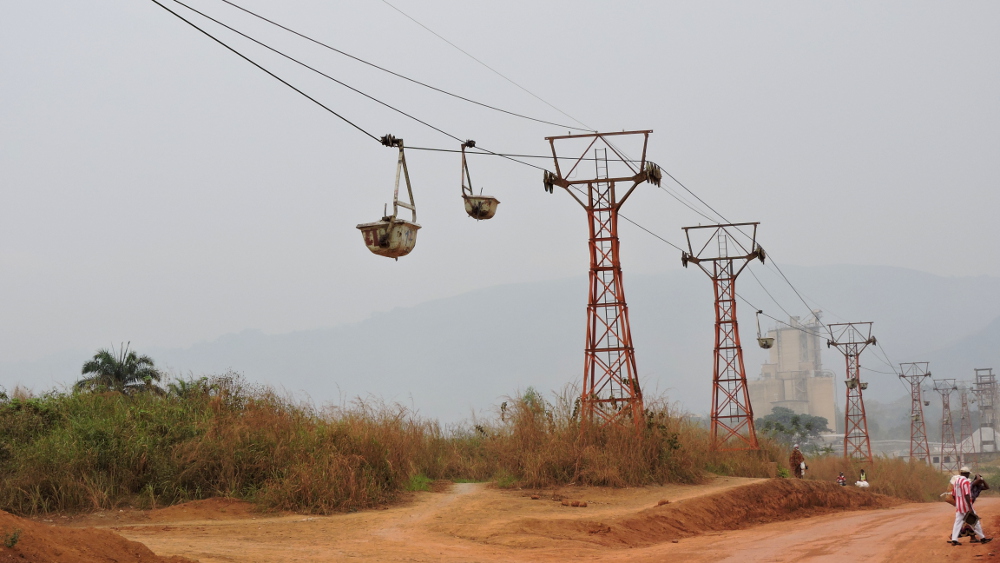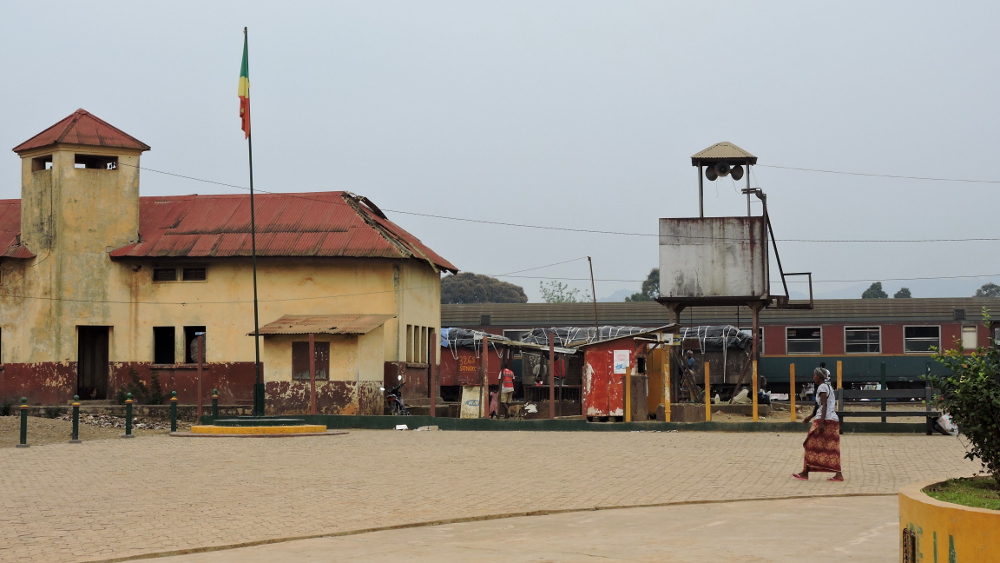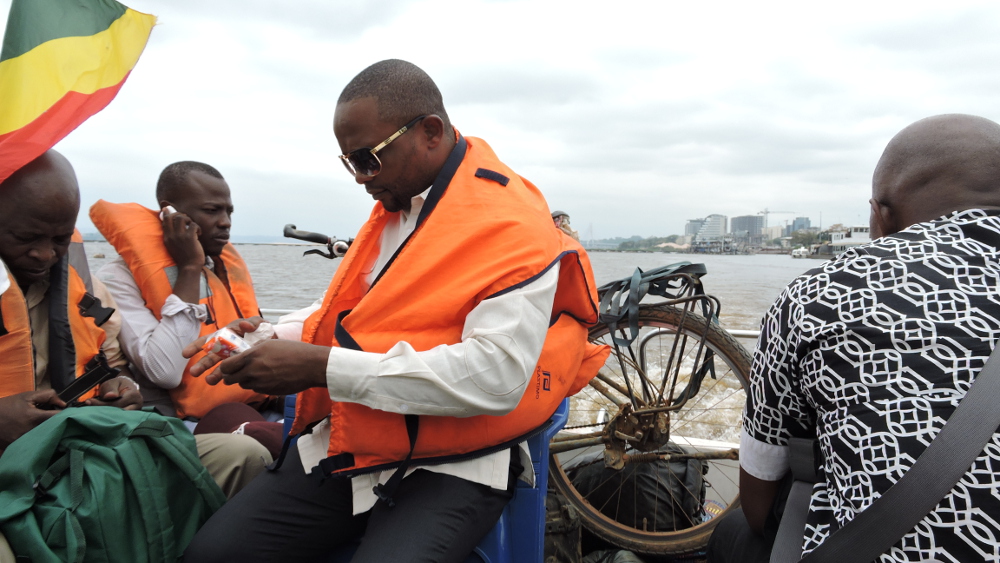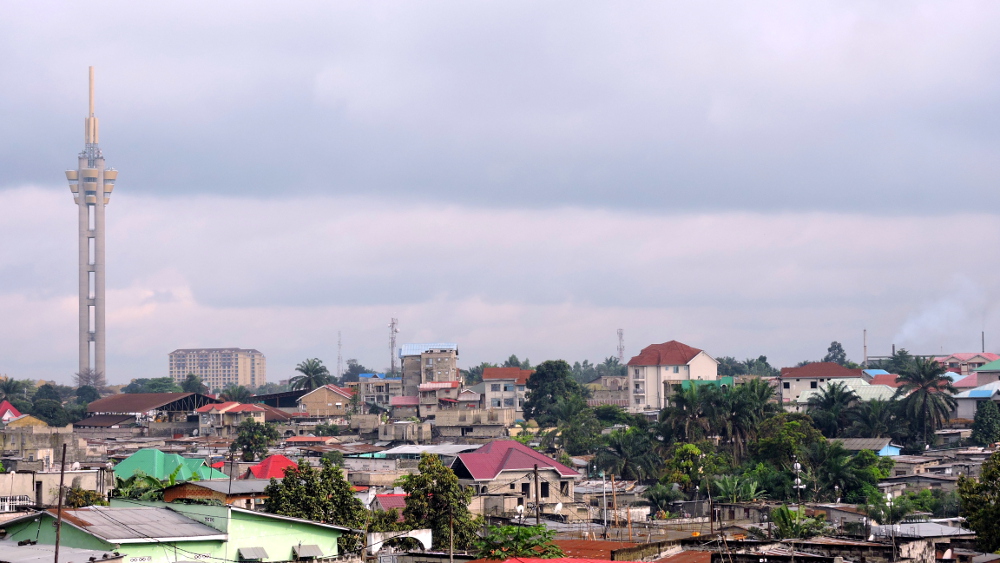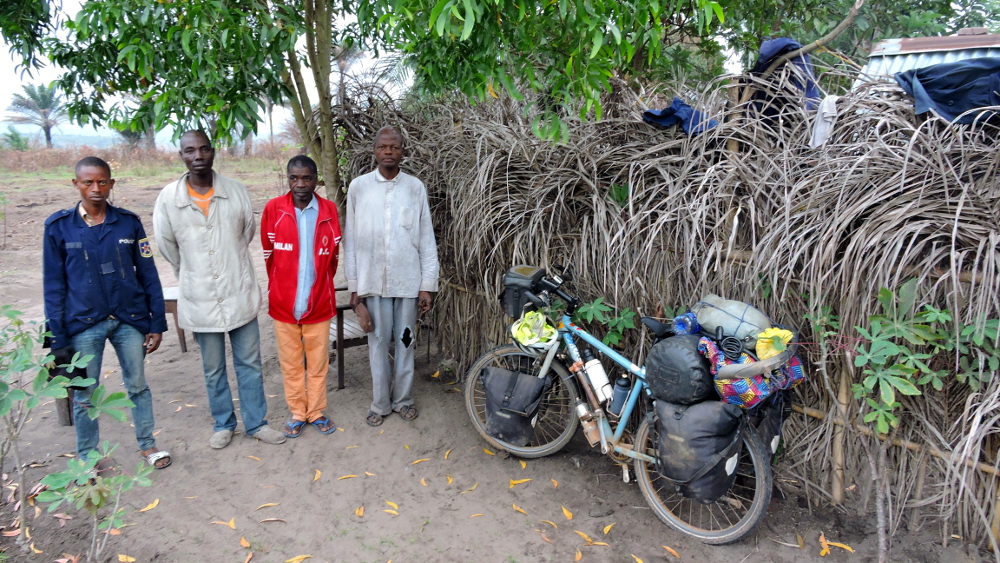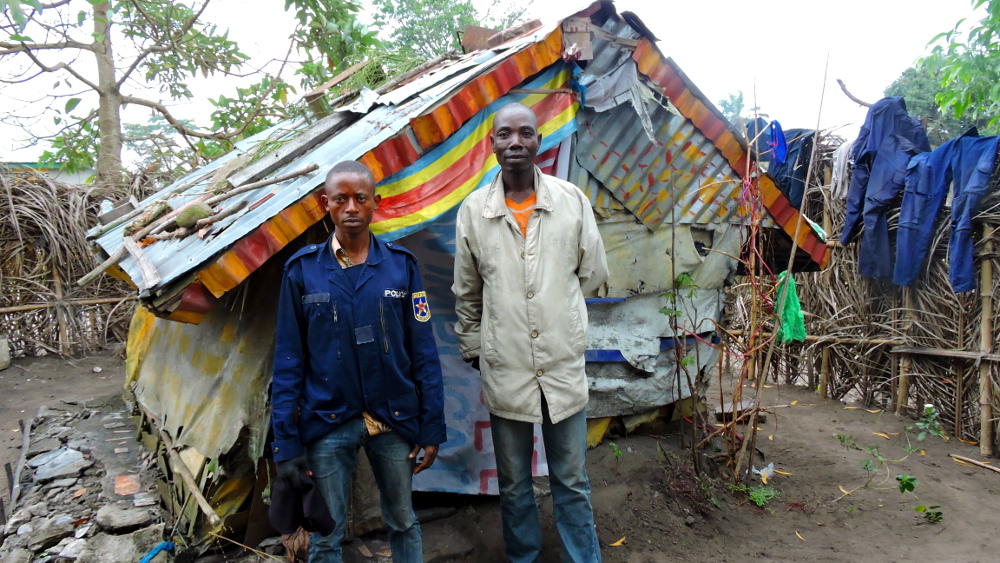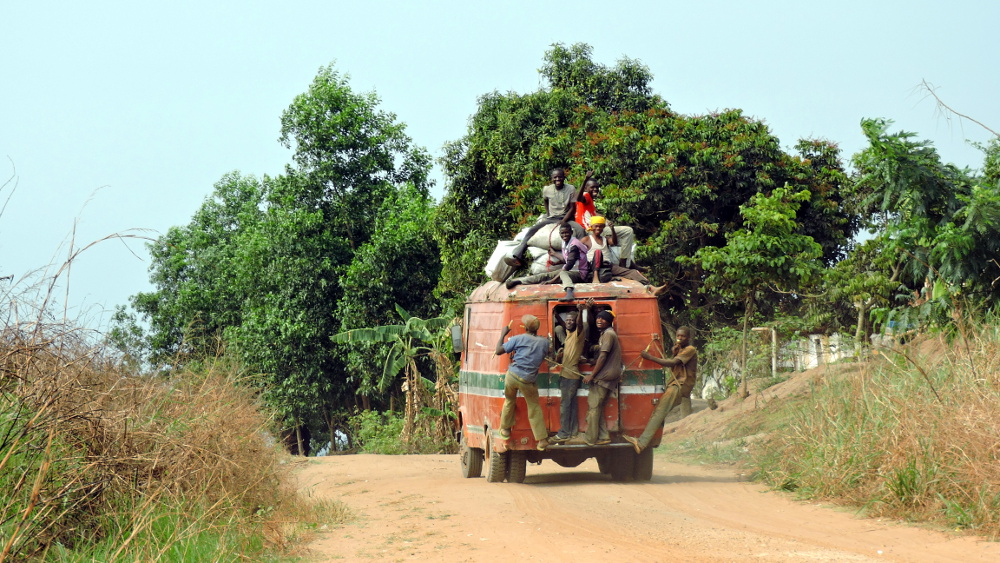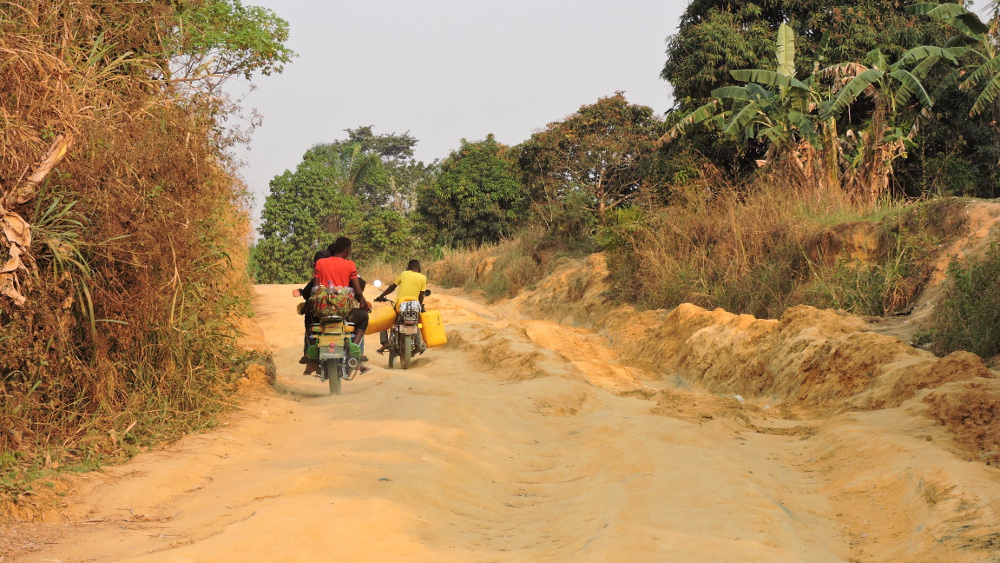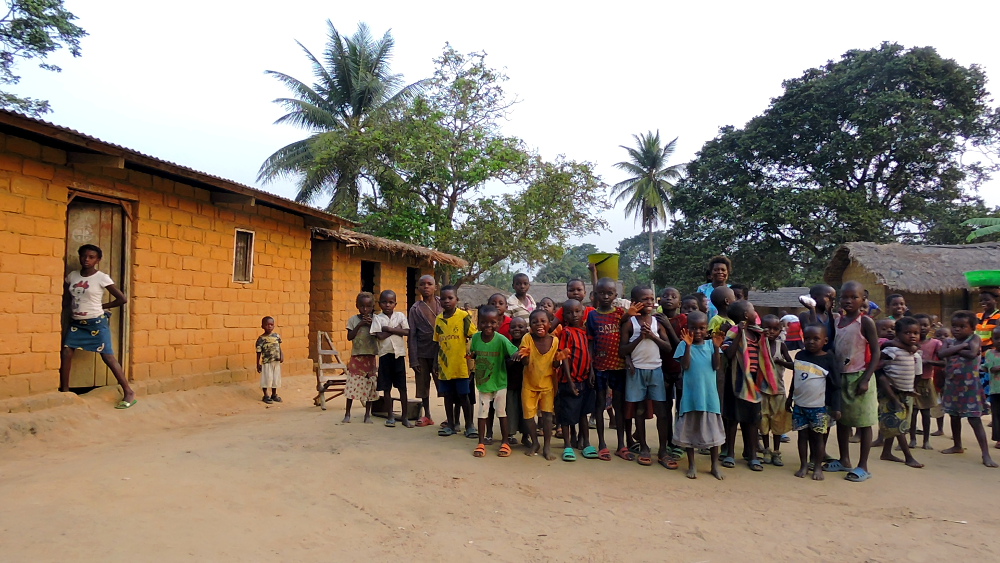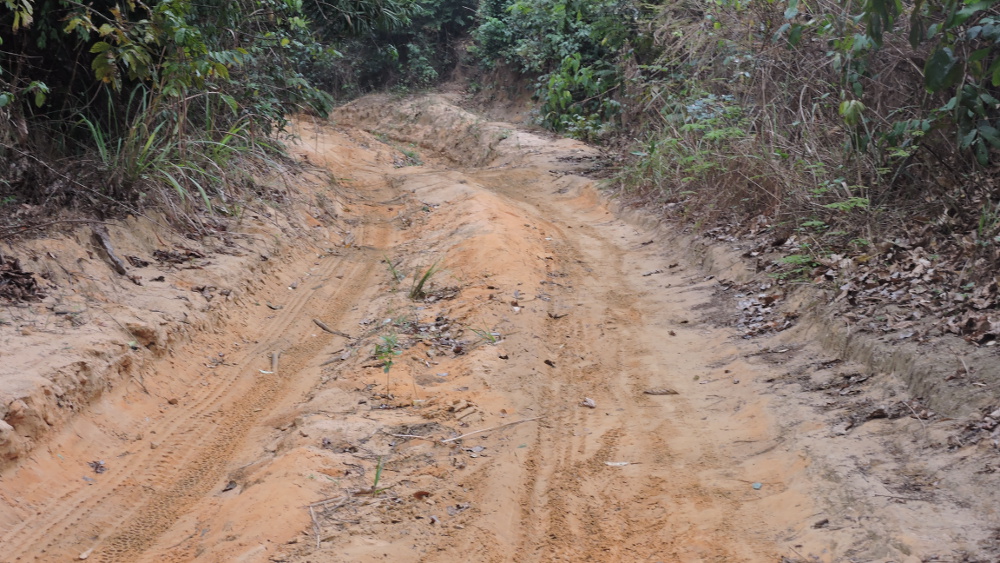Cycling in the two Congos
Two countries with almost the same name: Congo. One with the prefix “Republic” and the other one “Democratic Republic”. Doesn’t make much of a difference. To make it clearer, one adds the name of the capital: Congo Brazzaville and Congo Kinshasa. They’re next to each other. Apart from the name, they’re two very different countries. When the Congo makes it to the news and the news aren’t good, then it’s usually Congo Kinshasa.
And one can bike there?
Congo Brazzaville
After I had made it through the mud in Gabon, I reached the border with Congo Brazzaville (which is first up), completed crusted in mud.
Once again, they wanted papers for the bike but after discussion let me pass.
In Gabon they had told me, the road would get worse. Now I was told that it’d improve. Reuben, the motorbike guy, had told me the 250 kilometers after the border were very bad.
Now I could find out for myself.
The rain helped me because it made the sand denser and more navigable. The corrugation and stones were bigger problems for me. Despite predictions to the contrary, at least I could ride.
Once again, there were more goats than vehicles on the road.
The locals mainly walked.
Once again children who had fun with me. I didn’t know how far they needed to go to fetch water.
Others had it somewhat easier.
Here I got water pumped up from the ground which appeared to be the cleanest.
Before I got out the camera, I was surrounded by some children. Then most of them had vanished.
Once again, I saw deforestation.
I couldn’t see any forest and wondered where the tree trunks came from. A worker from Malaysia told me that on the border with Gabon, further east, some forest was left. For how much longer?
When a logging truck went past me, it got pretty uncomfortable.
No trees in sight but still very beautiful. And very hilly.
These hills reminded me of the Chocolate Hills on Bohol, The Philippines. Probably they also turn brown during certain times and one could promote them for tourists.
They’d definitely turn red if all the vegetation covers vanishes, like all the rest.
After a while, everything turned that color.
The advantage of the logging was that every once in a while, I found a nice place for a break. The hills, biking on gravel, and all the corrugated road surface were pretty exhausting.

The little ones must also have been tired at night.
They had walked for kilometers.
Periodically there were villages where I could get water. Every once in a while, I could buy something.
I asked in the villages where I could spend the night and always there was a village chief.
Clinics were also a good spot.
This shelter was the vaccination point for the school kids. The two benches were on loan from schools. In this area there were natives who lived in the forests. The children didn’t go to school but came here to be immunized. While here they should learn how to write their names.
Many people died from malaria because they preferred to first visit their traditional healer. When they came to the clinic, it was often too late.
Probably the Chinese also built roads here to make logging easier.
When I reached Dolisie after 250 kilometers, finally the road was paved. There was a Total filling station where I could buy a lot of treats for inflated prices, especially cold drinks.
Because of the rain, the Chinese roads have large drainage canals on the sides.

They didn’t have guard rails and some cars had accidents.
Along the gravel road there had been a lot of villages and it wasn’t a problem to find a place to camp. The new paved roads avoided the villages. In the past, roads were built to connect places. Now roads are built to detour villages.
Women who sold manioc by the road side, told me there was a village behind the trees.
I could camp with Pierre, the deputy of the chief. The chief was away.
By now the election results from Gabon were known. Ali had won which led to some protests. I was surprised because I thought it had been clear to all that Ali was the frontrunner. Pierre only laughed and said “That’s Africa. You can’t have elections without unrest”. He was right.
In addition to the roads, the Chinese also built clinics and schools.
This was a clinic. The schools looked very similar, a bit smaller, and without the ramp.
No matter if school or clinic, nothing seemed to be open because everything was in short supplies: equipment, teachers, nurses….
But there were caretakers and guards. These were good places to camp.
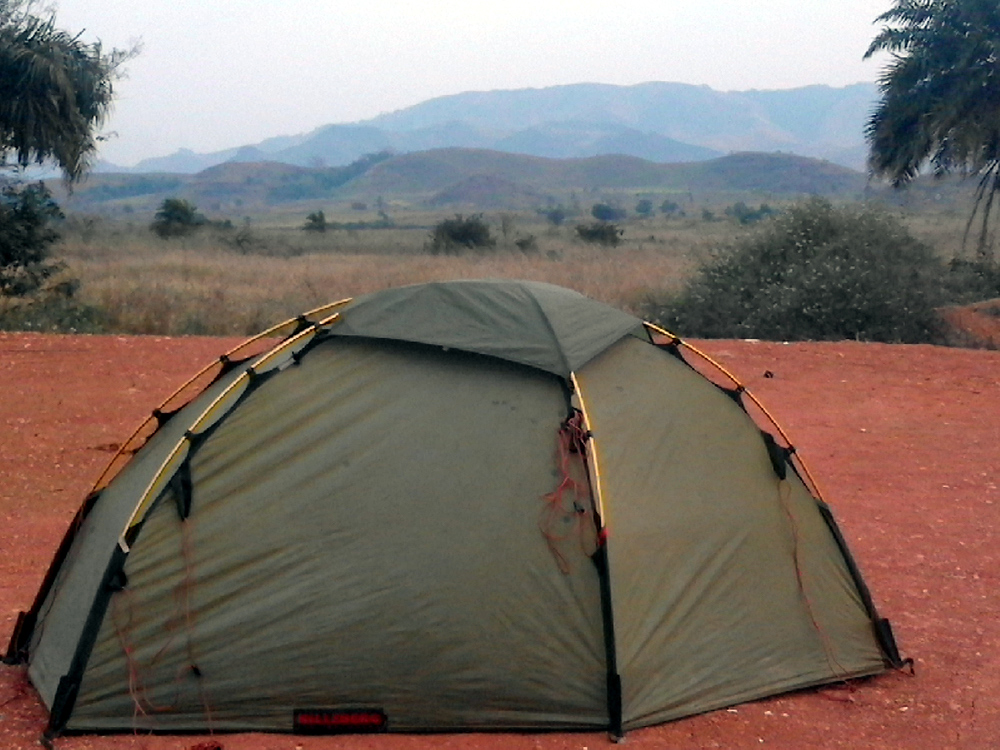
Because the new road avoided the town, I only seldom came to a shop. The old roads to the villages were seldom marked and were usually made of gravel.
This was Loutété
No, this wasn’t a funicular but a conveyor belt of the cement plan. A remnant from the Germans.
The railway was apparently also German.
The usual vehicles once again weren’t two-wheelers but one-wheelers.
The little brother who had been in the wheelbarrow quickly hid behind it.
And then once again onto the new road.
After the joy of being on a paved road had passed, it got very boring.
The routing of this new road was neither on my map nor on my GPS. That’s how it happened that I took a different route than planned. Between here and the 140 kilometers to Brazzaville there was hardly anything at all.
If I was lucky, I met people on the road whom I could ask about the nearest village.
I wondered what was the purpose of this road? No traffic, no village, nothing! Only for me?
A very new road led directly to the capital. A bridge paralleled the Congo River but it was only passenger vehicles, which were owned by the rich, were allowed. Taxis, busses, trucks and mopeds had to take the old road.
After I convinced a policeman that my bike was a bike and not a moped, I could take the new road.
It was a joy. There was virtually no traffic, I biked right next to the Congo River for about six kilometers, and then I reached downtown. Under the bridge there were huts where people lived. They probably didn’t think that the bridge was so great.
Brazzaville was a city where I’d have liked to stay longer. But there were a lot of uncertainties about my future travels and I soon had to enter Angola. Therefore, I continued the next day.
The capitals Brazzaville and Kinshasa were only separated by the Congo River. There wasn’t a bridge but only ferry connections.
When I reached the harbor, I was immediately told that I couldn’t cross because the big boat which could take my bike was broken. Then they suggested that I could hire a boat for about USD 120.
By now I had been in Africa long enough to know that it could also be done otherwise. I waited and asked more people.
Eventually one of the top brass of the ferry company took pity. When he saw my bike, he said of course it’d fit on a smaller boat. I called him my “savior” and then he became even friendlier. He took care of everything, including my exit stamp. First, they wanted CAF 10,000 (15 Euros) but then it was free.
My name was added to the waiting list for the boat and after a one-hour wait, I could cross.
Unfortunately, I didn’t know, if I’d be allowed to enter Congo, Kinshasa. I didn’t want to think what would happen, if not. Probably the whole story with the boat again.
Congo, Kinshasa
Congo, Kinshasa (about which I write from here on) also preferred that the visa be issued in one’s home country or country of residence. I had obtained my visa in Benin and a lot of travelers were turned away at the border for that reason.
The crossing took 15 minutes.
On the other side, porters fought over my luggage. It’d have been much easier, if I could have put it back on the bike.
Then I reached immigration and the question was whether Benin was my country of residence. Truthfully, I answered, no.
I was taken to the office and questioned. As a cyclist I had a good reason, why I couldn’t have obtained the visa in Germany. He mumbled something about the embassy in Benin to his colleague. They shouldn’t have issued me a visa.
I had to list all the countries where I had been and where I wanted to go. The many visas in my passport were convincing. The official only wanted to see a hotel reservation for Kinshasa which I fortunately had made. He disappeared for about 15 minutes and then he returned with my passport and entry stamp.
What a relief. He was very nice and showed me where I could exchange money.
Esther, from Kinshasa, who had also crossed from Brazzaville, had invited me to stay with her. She raved about her big house and all the dishes she was going to prepare for me. Even so I had already booked a hotel because of the immigration requirements, I went with her.
That was an experience in itself. She lived about ten kilometers outside of the city in a very poor area. The house was big and modern but she lived in a small apartment in the house.
What I didn’t understand: why such big TV and electronic appliances if electricity perhaps came on after 6 pm, and one didn’t have a kitchen. There was only a gas bottle with a burner. No sink, no running water, no drain. Nothing. Just a lot of plastic bowls.
Esther was too tired to prepare anything. I went with the neighbor’s girl to find an internet café because I had to cancel my hotel.
While we braved the traffic on the four-lane road, I felt a hand in my pant pocket. It wasn’t my hand and it shouldn’t have been there.
Next to my feet in bike shoes with cleats were feet in flip flops. Too bad that must have hurt. First, square on the foot and then against the shin. The hand and its content disappeared from my pocket, the GPS remained. Welcome to Kinshasa.
I preferred to continue early the next morning.
First, I had to cycle in traffic ten kilometers back to Kinshasa and then crossed to the other side to continue south.
I had enough of the city and just wanted to get away. Eventually I had left the dirt and traffic behind me and continued on a pretty good road with fully packed minibuses.
Towards evening I saw a sign on a hill towards some kind of church. Some men were standing around and I asked whether there was a church on top. They confirmed. II asked if they thought I could camp there. They discussed and then called the community secretary who took me to the top of the hill. What a beautiful view.
On top wasn’t only a church but also the tomb of the founder of the church and the school. Very poor. The headmaster was a very nice elderly man. When he had money, he continued to build the school.
Usually the pastor was the richest man in African communities. He drove the largest car but not so here. He also wore torn trousers.
Apart from the secretary there were also two policemen who stood guard at the tomb. They were barely recognizable as such.
They insisted to be photographed in front of the police hovel in which they lived.
When I had my coffee in the morning they came and made a joint. Brand: home-made. They couldn’t afford anything else.
Soon the pavement ended and the fun began.
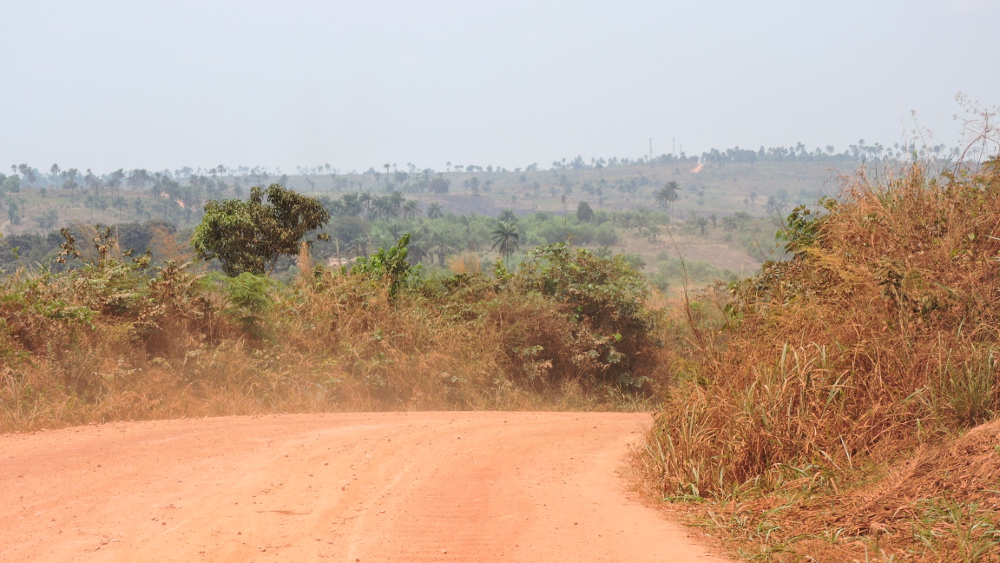
Congo Kinshasa appears to be the only African countries without Chinese. At least I didn’t see any.
On this stretch buses could still travel but that was soon over.
In addition to me there were only mopeds on this so-called road.
If a truck ventured here, it didn’t make it for long.

Not surprising because as usual it was totally overloaded.
At the evening I stopped once again with the village chief. It wasn’t fun. The poorer the country, the more children. They had now been following me for a while and tried to hang on to the bike. And that on this “road”.
Of course, they were immediately at the chief’s and I was surrounded
This is only half of them because the others disappeared when I took out the camera. And then they reappeared. They simply stood there and stared even so I didn’t do anything. It lasted for hours. I thought they must get bored, not at all and no chance to get some rest. When I disappeared into the tent, they stared at the tent. Nobody seemed to look after these children.
I got up at 5:00 am to have a peaceful breakfast. Not a chance. The first kid was already there and stared at me.
The roads got worse and worse.
I was almost alone except that the children continued to pursue me.
There wasn’t much chance to cycle here. Either it was very steep or the sand was deep.
I turned a corner and surprisingly there were some huts.
I liked this village chief better. He was a poor old man, few teeth but a big grin on his face.
In the evening he entertained his family and the neighbor around the fire. Unfortunately, I understood very little but there was much laughter.
It took me hours to travel the few kilometers to the border.
It was virtually only sand and I had to push!
I was really happy when I finally saw the border
Beyond the hills I could see Angola. Once again, the question, would they let me enter. If yes, for how many days? In Africa, even with a visa, one was never too sure.
I spent nine days in Congo Brazzaville and cycled 668 kilometers.
In Congo Kinshasa I took the shortest route and had crossed the country in five days and covered 248 kilometers.
Congo Kinshasa is seven times larger than Congo Brazzaville. Congo Kinshasa has almost twenty times the population of Congo Brazzaville which meant almost three times as many people per square kilometer. I guessed that 80 percent were younger than 20 years.
That was very apparent when one cycled.
And next time, Angola
